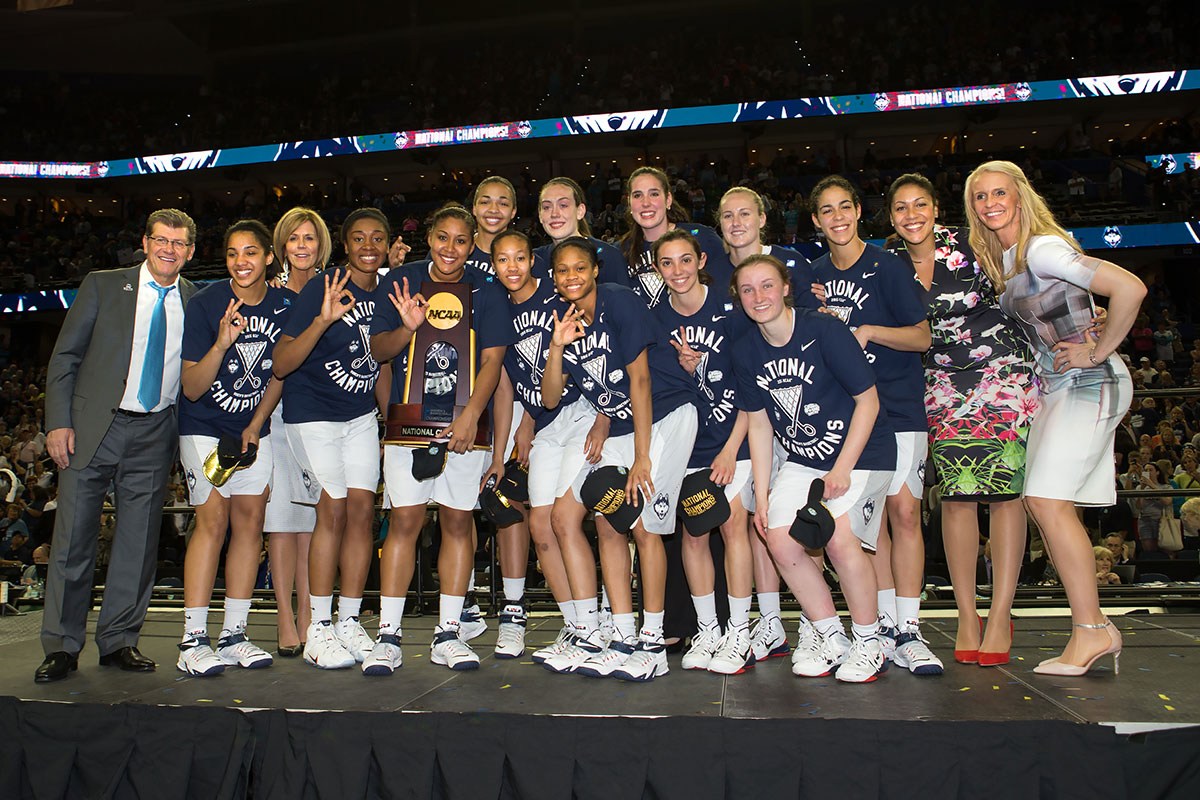The UCONN Women’s Basketball team just won their fourth consecutive national championship this Tuesday. The dominance of the UCONN team is so absurd that to win $10 on UCONN’s triumph, you had to bet $700. I am, unabashedly, a gigantic, fervent fan—I bleed blue. I have scrapbooks with newspaper articles I cut out with safety-blade scissors. I had a framed photo of me sitting on Shea Ralph’s lap with neon striped shoes that I strongly considered taking to college with me (both the shoes and the picture). I wanted to be them.
Growing up, I didn’t really understand that being such a fanatic about a women’s college basketball team made me an anomaly. Rather I felt a kinship with the older spectacled women trying to sell themed Beanie Babies on Connecticut Public Televison (CPTV). I couldn’t understand why the UCONN Snuggie cost a $400 donation, I just knew I wanted it so, so badly. It was torture enough that nobody in my family was over 5’6, why can’t I have the god-damn beanie baby?
When I got older, wiser, and significantly less interested in the merits of my beanie baby collection, I came to realize that the women advertising were trying to raise funds to be able to give any screen time to the women’s team. Otherwise, regardless of their impressive dominance in the sport, they would never be given the same media attention as the men’s team whose credentials were not nearly as remarkable.
Recently, five stars of the United States women’s national soccer team filed a federal complaint on behalf of the entire team charging that they’re paid nearly four times less than their male counterparts and calling for the Equal Employment Opportunity Commission investigate US Soccer for wage discrimination. Women in sports are denied equality in screen time, in media exposure, in sponsorship, and evidently in pay. Why is there such blatant inequality in an industry so influential on mainstream media? Why do we accept it?
Nearly all pro sports have significant pay gaps, usually with the justification that male athletes are so often paid many, many times more than their female counterparts for doing the same job because men’s sports are generally more popular and thus, more profitable. Men bring in more revenue and therefore, no matter how well or poorly they perform, it’s more valuable when they play the game. Why? Why do you like watching men’s sports better? It’s not because they’re fundamentally better, that men necessarily possess more skill or more capacity for strategy. But rather, it’s because you’ve been taught to believe that men excel at sports while women are confined to a league of their own. I’m not denying that men and women generally differ in their physicality. But I believe it’s because whenever you turn on SportsCenter, men are usually on the screen in replays or offering their two cents because male domination is systematic.
So why aren’t more women more up in arms? Why aren’t stands filled with ladies with foam fingers chanting? In 1978, in the midst of the second-wave feminist movement, Hollis Elkins, a professor of women’s studies at the University of New Mexico, Albuquerque, published a paper that asked why the women’s movement hadn’t ever concerned itself with equality in sports.
First, female athletes were assumed to be hostile toward the women’s movement. Second, feminists didn’t want to be damned by the suspicion of lesbianism already prefacing most conversations about feminism. Third, sports were seen as a realm where men exhibited and asserted their masculinity, stigmatizing sports to many feminists Lastly, sports were considered “frivolous” and not as important as other feminist causes. Feminists need to focus on sports because it’s an institution of massive cultural significance and an area rife with “serious” issues, such as sexual violence, pay inequality, and a lack of women in leadership positions.
Get in the stands and support our woman teams at SLU. The amount of time and dedication they commit is extraordinary and they deserve stands filled with more than their relatives and dogs.



